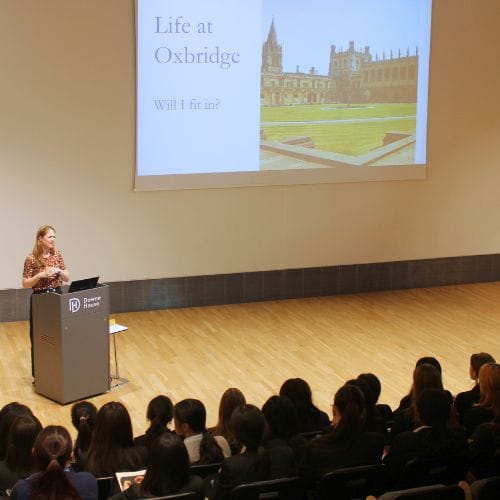
This article was written by Millie from the Upper Fifth (Year 11) as part of the Pioneer, Edition 1. The Pioneer is a magazine packed with lots of exciting and interesting things to do and learn about STEM subjects – Science, Technology, Engineering and Maths; and a little bit about what it’s like to study STEM at Downe House.
Sound is very important for humans to function as without it we wouldn’t be able to hear and hence we wouldn’t be able to speak and communicate with others. Without the ability to communicate as we are able to, it would have most likely taken us a lot longer to evolve into the functioning society we are today, but, have you ever been in a place which is completely silent? A place which is fully void of all noise? I think it is very unlikely that you have.
No matter how quiet a place is that you have been, there will always have been some background noise, for example the gentle humming noises made by electronic devices which you wouldn’t usually take much notice of. An anechoic chamber is a room which is designed to block out external sound and absorb the reflections of sound and electromagnetic waves within the chamber, so they don’t cause echoes. This means when a person enters they cannot hear any sound produced by the world outside the anechoic chamber. Anechoic chambers can accomplish this by having multiple layers of steel and concrete surrounding the chamber to block out external noise, and foam wedges lining the walls, ceiling and floor as to absorb any sound inside the chamber and prevent echoes.
But what is it like inside an anechoic chamber? When inside an empty anechoic chamber you can only hear the noises you produce yourself, the noises you cannot usually hear, for example, you start to be able to hear the sound of your heartbeat, the sound of your bones grinding as you move and a loud ringing noise in your ears. So, how does the silence impact your body, and why?
You may start to lose your balance because there are no sound reverberations, this is an issue as it would result in you struggling to walk, or at least, struggling to walk in a straight line. You also lose some of your spatial awareness because of the lack of reverberations as we cannot accurately judge how far away something is without sensing the sound waves which bounce off it.
Studies have shown that silence decreases heart rate and blood pressure as there are less stimuli for the body to detect and interact with, so the body can relax more. Silence is also beneficial for when you want to focus on something for this same reason. Silence can be calming and meditative, which is why it is easier to sleep when you are in a quiet area.
So, silence at chosen times can be a healthy choice but, our body has evolved to work with noise, not without it.
Read more from our Downe House pupils...
Tours & Open Mornings
The best way to find out more about Downe House is to experience it for yourself. Book a personal tour or join us at one of our Open Mornings, available throughout the year.
Discover











